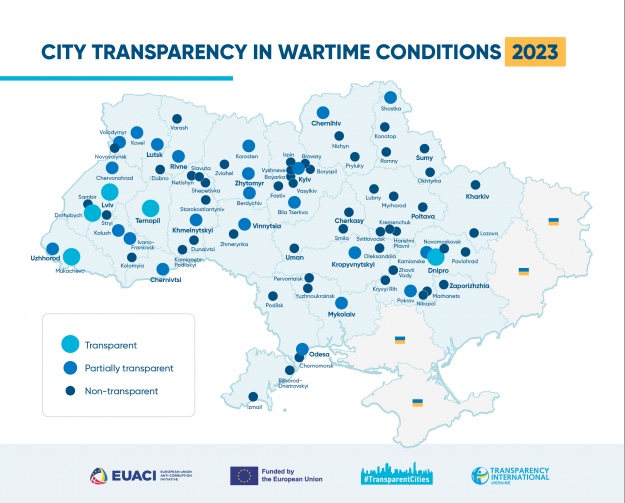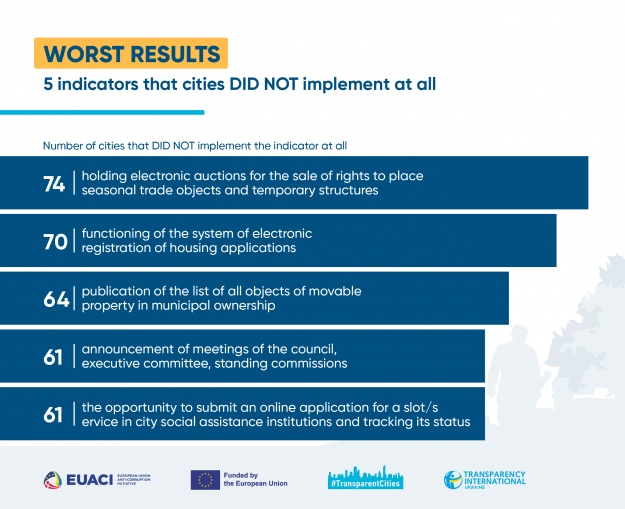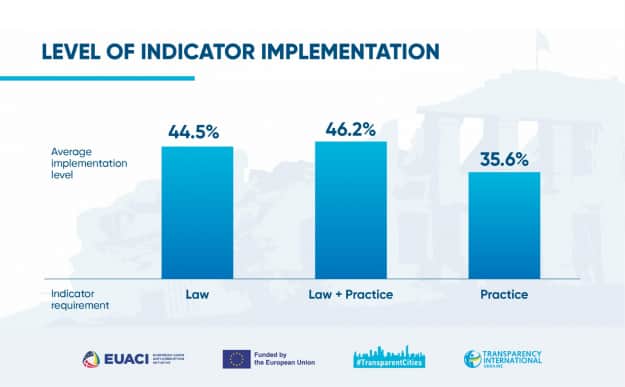Why Transparency in Ukrainian Cities Is Insufficient and How to Change It
Many people had worked to ensure that 2023 was a year of adaptation to challenges and a return to openness and transparency. On the one hand, it is important to consider the context and challenges of the war; on the other hand, effective communication with citizens should be ensured so that they do not have a feeling that the authorities have forgotten about them. The spring of 2024 and, especially, the recent shelling of Ukraine's energy infrastructure show that waiting for "better times" in terms of transparency is not the way out.
Our lives are here and now, so changes must take place immediately. The 2023 City Transparency Study by Transparency International Ukraine indicates that there is still a lot of work to be done in this area. But there are opportunities for achievement.
Let's find out which ones.
Results of the cities in 2023
According to our estimates, in 2023, 5 cities out of 80 were recognized as transparent -- Dnipro, Drohobych, Lviv, Mukachevo, and Ternopil.
23 cities were partially transparent. The remaining 52 cities (65%) were awarded the status of non-transparent. This can be called insignificant progress because last year, there were three cities on the transparent list.
Perhaps most interestingly, one of the "newcomers" -- Drohobych -- was recognized as non-transparent according to the results of the 2022 study.
Advertisement:
I should note that in the previous study, our team assessed 70 cities according to 40 updated criteria, and this time, the list of cities increased to 80 and the number of criteria to 50.
10 newly assessed cities are from the frontline zones. Even there, despite the difficult conditions, we see limited progress. Interestingly, among them, two cities were awarded the status of partially transparent (the rest are non-transparent), and the state of transparency almost does not differ from the rear cities and reaches 39.4%.
In general, the average level of city transparency in 2023 was 42.3%, compared to 37.5% in 2022. Among the 70 city councils that participated in both studies, 30 improved their performance by 5% or more.
14 cities moved to the higher category.
What did cities do best in 2023?
- The completeness of the published decisions of the city council and the executive committee, orders of the mayor (87.5%);
- Updating the list of civil protection shelters every six months (76.3%);
- Quarterly publication of budget implementation reports (73.8%);
- Sharing up-to-date information on the operation of business in martial law conditions (72.5%).
However, municipalities still restrict citizens' access to information about their activities, share limited information about the appointment of personnel outside the competition, and engage citizens in decision-making in a restrained manner, in particular through participation in the operation of commissions (for example, on compensation for damaged/destroyed property) or the IDP Council. Even transparent cities -- Mukachevo and Ternopil -- are among the city councils that did not properly engage the public in both cases.

The reason here is not only in governance practices.
Even the operation in wartime does not exempt cities from the obligation to comply with the law, and in the second year of the full-scale war, some municipalities have begun to better comply with the relevant provisions. But still, the level of implementation of such indicators does not exceed 50%.

How to increase transparency in wartime?
After analyzing the data, we found that some city councils used security risks as an excuse to hide the unwillingness or inability to change. We don't want to call it systematic: the word "trend" fits more in this case.
Like last year, the study has again shown that the level of transparency does not depend on the size of a settlement, and often the proximity to the hostilities zone is not an obstacle in the desire to become more open to the public. For the most part, everything rests on political will and motivation. The war continues, and in the coming years, the cities will face many challenges.
In the past month alone, we have witnessed one more time how the enemy terrorizes Ukrainians with shelling of the energy infrastructure. In the future, such trends may intensify. That is why full-fledged communication between local authorities and citizens is not a whim but a necessity, especially in wartime.
The transparency of such processes gives citizens a sense of security and confidence. Therefore, the authorities need to make every effort, adapt to war conditions with caution, and increase transparency. International partners are equally interested in the transparency of Ukrainian cities.
Over the past year, we repeatedly witnessed how friendly countries and even their individual municipalities developed their assistance programs for the reconstruction of specific Ukrainian cities. Our latest study of public opinion also strongly suggested that both citizens and city authorities were interested in an individual recovery plan that would focus on the specific needs of communities. Without ensuring transparency in governance, this will not be realized.
With this in mind, we provide recommendations to increase the transparency of cities.
- stream or publish within 24 hours the recordings of meetings of the city council, the executive committee, and standing commissions;
- include citizens in advisory bodies (IDP Councils, commissions to consider applications for compensation for destroyed property, and public commissions on housing issues);
- publish lists of persons appointed to positions outside the competition;
- ensure transparent accounting and management of municipal property and land, as well as humanitarian aid received;
- avoid restricting access to datasets (unless otherwise required by applicable regulatory acts);
- ensure they are in a machine-readable format.
We believe that transparency is a prerequisite for sustainability, development, and efficiency, especially in times of war. At a time when resources are scarce, the number of problems is increasing, and demographic challenges are growing, it is crucial to be adaptive, effective, transparent, and accountable. These are not only key components of our survival and resilience, but also the key to a successful path to the EU.
We are aware that the power of challenges will only grow, the context will change greatly, and resources will have to be further optimized. This is a difficult task, not only for local self-government bodies and the state. Active citizens should become players in this field and assume a part of the changes--to motivate and inspire the authorities, help them find solutions, monitor and control, and, if necessary, exert pressure responsibly.
This requires teamwork. Anastasiya Mazurok, Deputy Executive Director for Operations, Transparency International Ukraine The project is implemented by the European Union Anti-Corruption Initiative (EUACI), a leading EU-funded anti-corruption program in Ukraine, co-financed and implemented by the Danish Ministry of Foreign Affairs.
The opinions and views expressed by experts or organizations in this study do not necessarily reflect the position of the EUACI, the European Union, or the Danish Ministry of Foreign Affairs.
Disclaimer: Articles reflect their author's point of view and do not claim to be objective or to explore every aspect of the issues they discuss.The Ukrainska Pravda editorial board does not bear any responsibility for the accuracy of the information provided, or its interpretation, and acts solely as a publisher.
The point of view of the Ukrainska Pravda editorial board may not coincide with the point of view of the article's author.